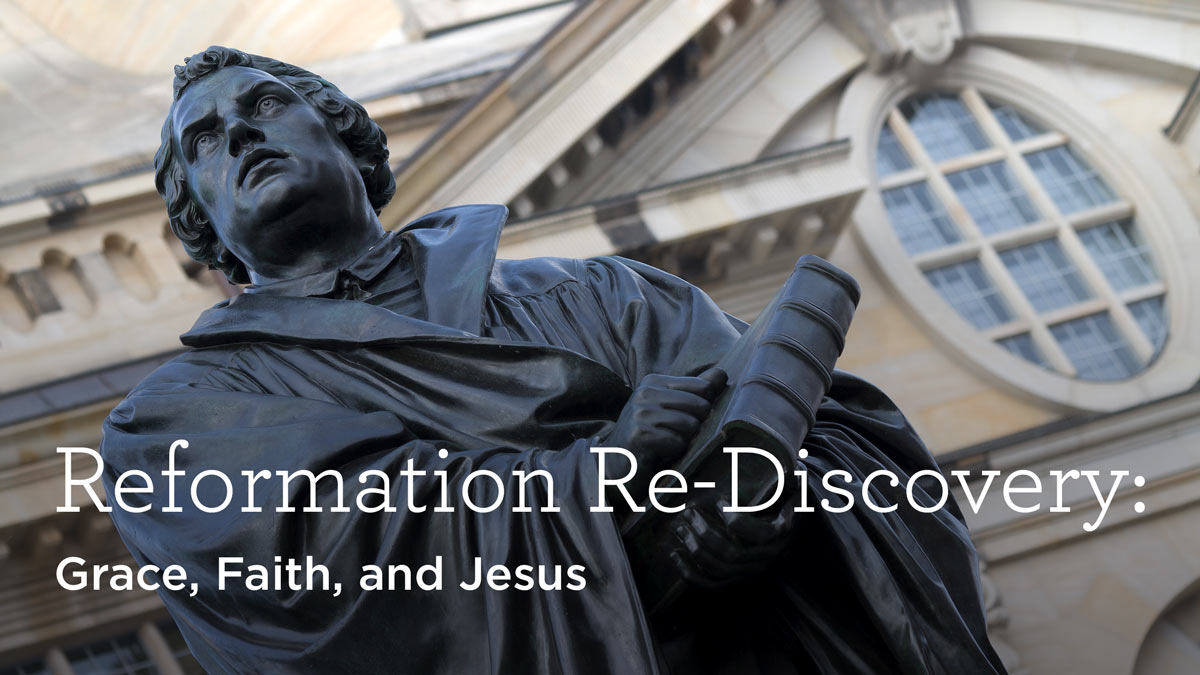
In his book The Madness of Crowds, Douglas Murray observes, “People in wealthy Western democracies” now have “absolutely no explanation for what we are doing here, and no story to give life purpose”1—no overarching narrative that guides our sense of where we fit on our earthly journey and in the unfolding panorama of our world. As the children’s nursery rhyme would have it, “All the king’s horses and all the king’s men” cannot “put Humpty together again.” We have, as a culture, fallen off the wall, and we lie in pieces on the ground.
A German Monk and Me
More than five hundred years ago now, there lived a German Augustinian monk whose life seemed to crumble before his eyes. He, too, experienced an identity crisis—but his struggle would shape the course of history down to our very day and beyond.
His name, as you might have guessed, was Martin Luther. Although he was a very religious man and perhaps had a more complete “big story” than many in our world today, he was ever burdened by the fact that his religion did not seem to grant him peace. No matter what he did or how hard he tried, he could not settle in his own mind whether he would ever find himself accepted by God.
Nothing Luther did seemed to help. He simply could not figure out how to earn favor with his God. And, of course, that’s by design, isn’t it? Indeed, there is absolutely nothing we can do to find our way back to God. Rather, He must come to us and free us from our bondage to sin. Salvation is not a reward that is given out, nor is it an achievement to which we can point. It is a gift of God’s grace.
Salvation is not a reward that is given out, nor is it an achievement to which we can point. It is a gift of God’s grace.
When God opened Luther’s mind to the biblical idea of salvation by grace through faith, he said, “Here I felt that I was altogether born again and had entered paradise itself through open gates.”2 From our perspective, we like to say that Luther rediscovered fundamental Gospel truth. But perhaps we might say that Luther himself was actually uncovered by the Gospel. Before Luther, this truth largely had been buried for centuries under layers and layers of religious tradition—and not unlike many who still get lost in certain customs to this day, Luther had missed altogether the free gift of God.
Half a millennium later, we must still let the sweet noise of the Reformation’s recovery of the Gospel ring in our ears. This rediscovery is often encapsulated in the five solas, or “onlys,” by which many Protestant churches abide: (1) only Scripture, (2) only grace, (3) only faith, (4) only Jesus, and (5) only God’s glory. While all five are absolutely essential, let’s consider three—grace alone, Christ alone, and faith alone—to help us recapture a truer sight of our identity and the story in which God has sovereignly placed us.
Grace Alone
We will consider first of all grace alone: only grace, sola gratia.
The story of salvation is the story of God looking for us. According to Ephesians 2, before God saved us, we were completely “dead in … trespasses and sins, … following the course of this world, following the prince of the power of the air” (vv. 1–2). In this deadness to God and His ways, we were blind to the reality that we are made by God, we are made for God, and we are made for a relationship with God.
We are made by God, we are made for God, and we are made for a relationship with God.
If we don’t worship God as we were created to do, we will try to find other things to fill in the God-shaped hole in our lives. But, of course, whatever we try to force into that space never quite meets our expectations. Years ago, C. S. Lewis described it like this: “We are half-hearted creatures, fooling about with drink and sex and ambition when infinite joy is offered us, like an ignorant child who wants to go on making mud pies in a slum because he cannot imagine what is meant by the offer of a holiday at the sea. We are far too easily pleased.”3 Unless we find God—unless He finds us!—we are left with emptiness and futility on a journey with no destination in sight.
We must also carefully point out that we are not just aimless; we are outright rebellious. Paul reminds us that “by nature,” we are “children of wrath” (Eph. 2:3). It’s far from being a popular truth in the twenty-first century, but the Bible is clear that God’s settled reaction to our sin is His just anger.
The wonderful news of the Gospel, however, is that God’s wrath and His love always go hand in hand. This is something that each of us has likely experienced in other relationships as well. Don’t you find yourself angry when you see those whom you passionately love harming themselves by their foolishness? Does the cancer surgeon not find herself fiercely angry at the cancer that riddles the one she seeks to save? Do you not find yourself angry when you look at the injustice of our world? In fact, if you’re not angry, maybe it’s because you don’t care enough.
You see, the real notion to stumble over is not the idea that God would be wrathful but the idea that God would be indifferent. Could you actually believe or trust in a God who is apathetic to man’s rebellion, who doesn’t care about sin—who says, “Just do whatever you want. It’ll all be fine in the end. Maybe you can shore your situation up with another dose of religion.” No! God has made us for Himself. And by His grace and His grace alone, He will make a way for us to move past His wrath and receive the favor of His blessing again.
Christ Alone
God’s grace, then, cannot be separated from Christ, who is Himself the fountainhead of all God’s grace and mercy to us. Consider, for example, that in 2 Corinthians 13:14, Paul says to his readers, “The grace of the Lord Jesus Christ and the love of God and the fellowship of the Holy Spirit be with you all” (emphasis added). Such grace is not a substance or commodity. It’s not something that is apportioned out by the church—a little grace here and a little grace there. No, the only way we ever know grace is in and through Jesus Christ.
So it is no surprise that the great cry of the Reformation was not simply sola gratia but also solus Cristus—in Christ alone. As Paul tells us in Romans 6:23, “The wages of sin is death, but the free gift of God is eternal life in Christ Jesus our Lord” (emphasis added). It is only and ever in Jesus Christ that we can know the endlessly amazing grace that God has for us.
When a person discovers grace, it’s because they’ve discovered Jesus. And when a person discovers Jesus, it’s because they’ve discovered grace.
When a person discovers grace, it’s because they’ve discovered Jesus. And when a person discovers Jesus, it’s because they’ve discovered grace. In the New Testament, Jesus is not giving us instruction about how to make ourselves Christian: Try and do this, and try and do that, and stop doing this, and stop doing that. That’s the story of religion. No, instead, Jesus Christ in love gave all of Himself on the cross (Eph. 5:2) so that we might know full and everlasting life.
Faith Alone
We are saved by grace alone, through Christ alone, and, finally, by faith alone—sola fide. The free gift of grace to us through Jesus Christ is of no value to us if we never receive it. Grace is the source. Christ is the gift. Faith is the conduit. “By grace you have been saved through faith,” says Paul (Eph. 2:8).
We must note, however, that this is not a transaction whereby God brings to the table grace and we, in and of ourselves, bring to the table faith. Faith is not our contribution. Faith is our response. Faith itself, says Paul, “is not your own doing; it is the gift of God” (Eph. 2:8).
Moreover, salvation is not merely some achievement of the mind, as if we say, Aha! I’ve finally figured it all out, and I can now accept Christ for who He says He is. Certainly, there should be intellectual inquiry, which both the Bible and the Christian faith encourage. But ultimately, faith is a gift. The same goes for our attempts to “be a better person.” Faith is never “a result of works, so that no one may boast” (Eph. 2:9). Faith is forever a gift.
The nature of faith is to lean entirely on what God has done for sinners in Jesus Christ. It is to look outside of ourselves, not into ourselves, for hope and meaning. It is to find the story that we have written for ourselves and that we have absorbed from the world around us sorely lacking. Faith is to flee from false narratives that end only in meaninglessness and despair and to cast ourselves upon Christ for hope, purpose, and, of course, salvation from our rebellion against our Holy God. The old hymn captures it well:
Nothing in my hand I bring,
Simply to Thy cross I cling;
Naked, come to Thee for dress,
Helpless, look to Thee for grace;
Foul, I to the Fountain fly;
Wash me, Savior, or I die.4
A New Story
Who or what are you trusting in today? More specifically, who or what are you trusting in to give you hope in life and courage in the face of death? Perhaps, not unlike our friend Martin Luther, you have looked to your own achievements—what you can bring to God and do for Him. But as Luther quickly discovered, the unfolding of that story will not satisfy. We can neither be good enough nor do enough good to earn the favor of Almighty God.
There is a better story, though. It is a tale of grace alone, through faith alone, in Christ alone. Like any good story, there is drama and intrigue and a series of ups and downs in the plotline—at least from our finite perspective. But perhaps one of the most wondrous aspects of this story is that while it is yet unfolding, we already know the end. Like in the most captivating fairy tale—though better because the events are true—all who claim this story as their own through faith will truly live happily ever after.
Christ is the only Savior, because Christ is the only one qualified to save. That’s the story— completely good, fully true, and wondrously beautiful. How will you enjoy it and live it out?
This article was adapted from the sermon “Grace, Faith, Jesus” by Alistair Begg.

1 Douglas Murray, introduction to The Madness of Crowds: Gender, Race, and Identity (London: Bloomsbury Continuum, 2019), 1.
2 Martin Luther, “Preface to the Complete Edition of Luther’s Latin Writings,” in Martin Luther: Selections from His Writings, ed. John Dillenberger (New York: Anchor, 1962), 11.
3 C. S. Lewis, “The Weight of Glory,” in The Weight of Glory: And Other Addresses (1949; repr., New York: HarperOne, 2001), 26. Paraphrased.
4 Augustus Toplady, “Rock of Ages, Cleft for Me” (1776).
Topics: Articles